Submersible Pumps Decoded: Compare 15 Top Models to Win India's Water Game!
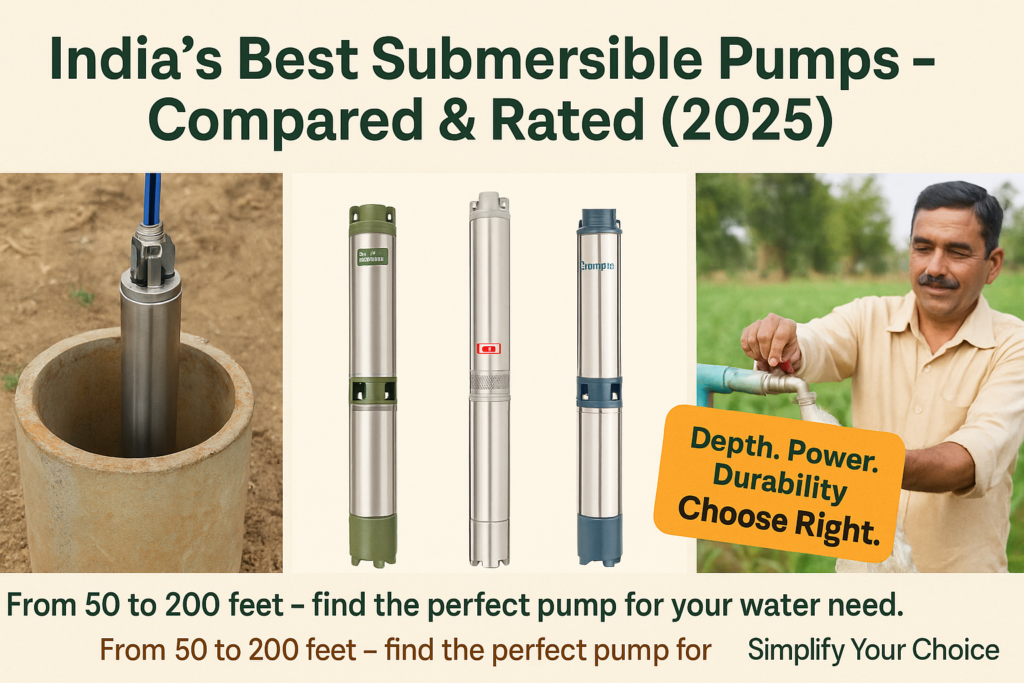
Hi, I’m Avani from GrowWithHeart. Choosing the right submersible pump in India can feel like diving into a sea of technical jargon. That’s why we’ve spent months analyzing 2,000+ verified reviews, talking to real pump dealers across states like Maharashtra, Rajasthan, and Tamil Nadu, and crunching data using our in-house machine learning tools to simplify your choice.
Whether you’re dealing with hard water in Gujarat or need a high-head pump for a 200 ft borewell in Uttar Pradesh, this guide is crafted for real Indian households and farms. No fluff, no gimmicks—just straight, scenario-based recommendations backed by customer voices and dealer insights.
Let’s decode submersible pumps together.
What You'll Discover
Low-Power Models
0.4–1 HP pumps are ideal for apartments, small homes, and shallow wells under 150 feet.
Mid-Range Powerhouses
1–1.5 HP systems perfect for medium-depth borewells and larger households.
High-Power Solutions
2–3 HP pumps engineered for deep borewells, farms, and commercial applications.
By the end of this guide, you’ll understand exactly which submersible pump matches your specific water situation—whether you’re dealing with a low-yield borewell in water-scarce Chennai, need reliable supply for your Pune apartment, or require heavy-duty performance for your Punjab wheat fields.
Understanding Submersible Pumps: The Complete Guide
What Are Submersible Pumps and How Do They Work?
A submersible pump is a specialized water pump designed to be completely submerged in water. Unlike surface pumps that sit outside the water source and pull water up through suction, submersible pumps push water upward from within the water source itself. This fundamental difference gives them significant advantages in efficiency, reliability, and longevity.
The working principle is straightforward but ingenious: an electric motor directly coupled to the pump unit drives an impeller (or series of impellers in multi-stage pumps). When the motor spins, the impellers create centrifugal force that propels water upward through the discharge pipe to your storage tank or distribution system.
Key Advantages
- • No priming required (self-priming)
- • Higher efficiency (uses less electricity)
- • Quieter operation (motor underwater)
- • Longer lifespan (water-cooled motor)
- • No cavitation issues at depth
- • Safer from flooding and weather
💡 How to Choose the Right Submersible Pump (with Real-World Scenarios)
Choosing the right submersible pump isn’t just about HP—it’s about your exact use case. Here’s how to make an informed decision:
1. Borewell Depth: More Depth = More Power Needed
Scenario: For borewells deeper than 150 feet (like in many Telangana or Punjab rural zones), go with a 1.5 HP or 2 HP submersible pump.
Recommendation: Models like the Kirloskar KS4E-1018 or Crompton 4W12 are well-rated for high-head requirements.
🔗 Explore our 1.5 HP Submersible Pump Guide for more options.
2. Water Quality (Hard Water vs. Soft Water)
Scenario: Gujarat and Rajasthan customers face hard water that corrodes ordinary pumps.
Solution: Go for pumps with stainless steel impellers and anti-rust coating.
🔗 See Crompton Submersible Pumps—many come with corrosion-resistant bodies.
3. Usage Type (Home vs. Agriculture)
For Homes: 1 HP pumps usually suffice, especially for 4–6 member families.
For Farms: Prioritize flow rate and energy savings over size. CRI and Kirloskar models dominate this segment.
🔗 Need a pump for farming? Check our Agriculture Pump Guide.
4. Budget & Brand Trust
We noticed Crompton wins on affordability, Kirloskar on longevity, and CRI on rural service.
A Rajasthan dealer told us: “Kirloskar lasts 8–10 years without major issues in dusty borewells.”
🔗 Compare major brands in our Kirloskar vs CRI Comparison Guide.
Three Main Types of Submersible Pumps in India
| Type | Best For | Typical HP Range | Key Features |
|---|---|---|---|
| Borewell Submersible | Deep, narrow borewells (4″-6″ diameter) | 0.5 HP – 5 HP | Slim design, multi-stage impellers, high head capacity |
| Openwell Submersible | Open wells, sumps, tanks, ponds | 0.5 HP – 3 HP | Wider design, single/few stages, higher flow rate |
| Sewage Submersible | Wastewater, drainage, flood control | 0.5 HP – 2 HP (residential) | Solids handling capability, clog-resistant design |
Key Components of a Submersible Pump
- Motor: Hermetically sealed, water-cooled electric motor
- Pump Housing: Contains impellers and diffusers
- Impellers: Rotating components that create water pressure
- Diffusers: Direct water flow between impeller stages
- Shaft: Connects motor to impellers
- Mechanical Seal: Prevents water from entering motor
- Intake Screen: Filters large debris
- Check Valve: Prevents backflow when the pump stops
- Discharge Outlet: Connection point for rising main
- Power Cable: Specially designed for underwater use
Key Factors to Consider When Buying a Submersible Pump
Expert Tip: The most common mistake Indian consumers make is buying a submersible pump based solely on horsepower (HP). While important, HP alone doesn’t determine if a pump will meet your specific water needs.
Horsepower (HP): More Than Just a Number
Horsepower indicates the motor’s power rating, but its significance depends on your specific scenario:
- 0.5 HP: Suitable for shallow wells (under 100 feet), small homes, or supplementary water supply
- 1 HP: The most common rating for residential use, effective for depths up to 150-200 feet
- 1.5 HP: Ideal for medium-depth borewells (150-250 feet) or larger households
- 2-3 HP: For deep borewells (250+ feet), agricultural use, or commercial applications
Head Capacity: The True Measure of Lifting Power
Head capacity—measured in meters or feet—represents the maximum height a pump can lift water. This is arguably the most critical specification when selecting a submersible pump.
Total Head Calculation
Total Head = Static Water Level + Drawdown + Vertical Rise + Friction Loss
- • Static Water Level: Depth to water when pump is off
- • Drawdown: Additional depth when pumping
- • Vertical Rise: Height above ground to tank
- • Friction Loss: Resistance in pipes (~10-15%)
Head Capacity Rule of Thumb
Always choose a pump with head capacity at least 20% higher than your calculated total head requirement to account for:
- • Seasonal water level fluctuations
- • Future water table decline
- • Pump efficiency degradation over time
- • Unexpected pressure requirements
Flow Rate: Meeting Your Daily Water Demands
Flow rate—measured in liters per minute (LPM) or liters per hour (LPH)—indicates how much water a pump can deliver. Your required flow rate depends on household size and usage patterns:
| Household Size | Typical Daily Requirement | Recommended Flow Rate |
|---|---|---|
| Small (1-2 people) | 500-1,000 liters | 15-25 LPM |
| Medium (3-4 people) | 1,000-2,000 liters | 25-40 LPM |
| Large (5+ people) | 2,000-3,000+ liters | 40-60+ LPM |
| Small Farm (1 acre) | 10,000+ liters | 100+ LPM |
Material Quality and Durability Factors
The materials used in a submersible pump significantly impact its lifespan, especially in challenging Indian water conditions:
Motor Winding
- • Copper: Superior conductivity, longer life (premium)
- • Aluminum: Less efficient, shorter lifespan (budget)
Always prefer copper windings for long-term reliability.
Pump Body
- • Stainless Steel: Corrosion-resistant, ideal for hard/saline water
- • Cast Iron: Durable but may corrode in aggressive water
- • Engineering Plastic: Lightweight, corrosion-proof (smaller pumps)
Impellers
- • Stainless Steel: Most durable, handles abrasives (premium)
- • Bronze: Good corrosion resistance (mid-range)
- • Noryl/Plastic: Lightweight, economical (budget)
Energy Efficiency: The Hidden Cost Factor
A submersible pump will likely run for thousands of hours over its lifetime. Even small differences in efficiency can translate to significant electricity cost savings:
- BEE Star Rating: Look for pumps with 4-5 star ratings from the Bureau of Energy Efficiency
- IE3 Motors: Premium efficiency motors consume 10-15% less electricity than standard motors
- Efficiency Curve: Check if the pump operates at peak efficiency at your required head and flow
Understanding Technical Specifications
When comparing submersible pump models, you’ll encounter various technical terms. Here’s what they mean and why they matter:
| Specification | What It Means | Why It Matters |
|---|---|---|
| Stages | Number of impeller/diffuser sets | More stages = higher head capacity (deeper wells) |
| RPM | Motor speed (revolutions per minute) | Higher RPM = more flow but potentially shorter lifespan |
| Phase | Single-phase or three-phase power | Single-phase for homes, three-phase for farms/commercial |
| Voltage Range | Operating voltage tolerance | Wider range = better protection in areas with voltage fluctuation |
| Starting Current | Initial current draw on startup | Lower is better for weak electrical connections |
| Insulation Class | Motor winding heat resistance | Class F or H preferred for longer motor life |
| Protection Class | IP rating for water/dust protection | IP68 is standard for submersible pumps |
How to Read a Pump Performance Curve
A pump curve is a graph showing the relationship between the head (vertical axis) and flow rate (horizontal axis). Understanding this curve is crucial for selecting the right submersible pump:
Key points to understand about pump curves:
- As head increases, flow rate decreases (and vice versa)
- The pump operates somewhere along this curve based on your system’s resistance
- The “best efficiency point” (BEP) is where the pump operates most efficiently
- Try to select a pump where your required head/flow falls near the BEP
Now that you understand the key technical aspects of submersible pumps, let’s examine how these factors play out in our comprehensive comparison of 15 top models available in India.
At-a-Glance Comparison: 15 Top Submersible Pumps for Indian Homes
We’ve analyzed 15 of India’s most popular submersible pumps across key performance metrics, price points, and real-world applications. This comprehensive comparison table lets you quickly identify which models best match your specific water needs and budget.
| Model | Price (₹) | HP | Head (ft) | Flow Rate | Key Features | Best For | Rating |
|---|---|---|---|---|---|---|---|
| Category 1: Low-Power Pumps (0.4–1 HP) | |||||||
Asian Pumps & Machineries 24V 300W | 8,800 | 0.4 | 170 | 1,500–2,000 LPH | Solar-powered, copper winding | Small irrigation, off-grid homes | |
CRI PLANO 50 Openwell | 8,100 | 0.5 | 50-70 | Not specified | Lightweight, efficient for shallow wells | Rural homes, open wells | |
V-Guard 0.5 HP Openwell | 6,898 | 0.5 | 50-60 | Not specified | Cable and starter included, silent operation | Shallow wells, tanks | |
CRI Submersible Pump 1 HP (10 Stage) | 10,000 | 1 | 213 | Not specified | Digital control panel, stainless steel build | Borewell-dependent homes | |
Flojet V-3 Submersible (1 HP) | 12,100 | 1 | 120-150 | Not specified | Fits 81mm borewells, compact design | Narrow borewells, tight spaces | |
Kirloskar KP4 JALRAAJ UVA 60 1010 | 12,299 | 1 | 120-150 | Not specified | 38mm outlet, multicolour design | Small to medium borewell needs | |
Crompton STPM12 1PH Sewage | 13,500 | 1 | 100-120 | Not specified | Sewage-handling, single-phase | Rural septic systems | |
Havells Openwell Submersible (1 HP) | 9,797 | 1 | 80-100 | Not specified | Single-phase, rust-proof with cable/starter | Medium wells or tanks | |
| Category 2: Mid-Range Pumps (1–1.5 HP) | |||||||
Crompton 4W12BF1.5E Borewell | 11,999 | 1.5 | 150-200 | Not specified | Water-filled, trusted brand durability | Consistent borewell pumping | |
V-Guard 1.5 HP (Nova OT1512) | 12,359 | 1.5 | 150-180 | Not specified | Digital control panel, 100mm borewell fit | Deeper residential borewells | |
Havells HI FLOW Submersible (1.5 HP) | 11,485 | 1.5 | 150-180 | Not specified | Water-filled, 100mm borewell compatibility | Medium-depth borewells | |
| Category 3: High-Power Pumps (2–3 HP) | |||||||
Asian Pumps V4 2HP Solar | 27,000 | 2 | 100 | 9,000 LPH | 110V BLDC, solar-powered, tank sensor kit | Medium farms, livestock watering | |
Flojet V-4 Submersible (2 HP) | 20,900 | 2 | 250-300 | Not specified | High-stage design for deep borewells | Serious irrigation projects | |
Kirloskar 2HP (KP4 JALRAAJ UVA 60 2016) | 21,192 | 2 | 200-250 | Not specified | 24-month warranty, single-phase | Deep, dependable pumping | |
Flojoy 3HP Solar Water Pump 4″ Deepwell | 56,500 | 3 | 520-530 | 10,000 LPH | BLDC, AC/DC controller, solar-powered | Large-scale solar irrigation | |
Top Rated Overall
- • V-Guard 1.5 HP (Nova OT1512)
- • CRI Submersible Pump 1 HP
- • Flojoy 3HP Solar Water Pump
The perfect balance of performance, reliability, and value
Best Value for Money
- • V-Guard 0.5 HP Openwell
- • Havells Openwell 1 HP
- • Crompton 4W12BF1.5E
Excellent performance without breaking the bank
Most Energy Efficient
- • Asian Pumps V4 2HP Solar
- • Flojoy 3HP Solar Water Pump
- • V-Guard 1.5 HP (Nova OT1512)
Lowest operating costs over the long term
This comprehensive comparison gives you a bird’s-eye view of India’s top submersible pumps. In the following sections, we’ll dive deeper into each category, providing detailed reviews and specific recommendations based on your unique water situation.
Let’s start by examining the low-power submersible pumps (0.4–1 HP) that are perfect for small homes and shallow wells.
Low-Power Submersible Pumps (0.4–1 HP): Perfect for Small Homes & Shallow Wells
Low-power submersible pumps in the 0.4–1 HP range are the workhorses of Indian residential water systems. These compact powerhouses deliver reliable performance for apartments, small to medium homes, and properties with shallow to medium-depth water sources.
In this section, we’ll examine the eight top-performing low-power submersible pumps available in India today, highlighting their strengths, limitations, and ideal use cases to help you find the perfect match for your specific water needs.
Our Top 3 Low-Power Submersible Pump Recommendations

CRI Submersible Pump 1 HP
₹10,000
Best For: Borewell-dependent homes with moderate depth (up to 200 feet)
Warranty: 2 years comprehensive
- •Power: 1 HP
- •Head: 213 feet (65 meters)
- •Digital control panel included
- •Stainless steel construction
- •Thermal overload protection
- •Suitable for 4-inch borewells
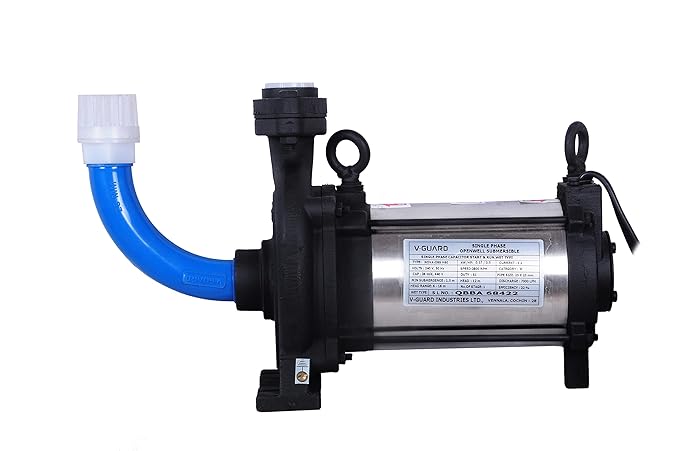
V-Guard 0.5 HP Openwell
₹6,898
Best For: Shallow wells, sumps, and tanks with minimal depth
Warranty: 18 months
- •Power: 0.5 HP
- •Head: 50-60 feet
- •Cable and starter included
- •Silent operation technology
- •Copper winding for durability
- •Energy-efficient design

Asian Pumps 24V 300W
₹8,800
Best For: Off-grid homes and small irrigation in sunny regions
Warranty: 1 year
- •Power: ~0.4 HP (300W)
- •Head: 170 feet
- •Flow Rate: 1,500–2,000 LPH
- •Solar-powered operation
- •Copper winding for efficiency
- •No electricity bills
Other Recommended Low-Power Submersible Pumps
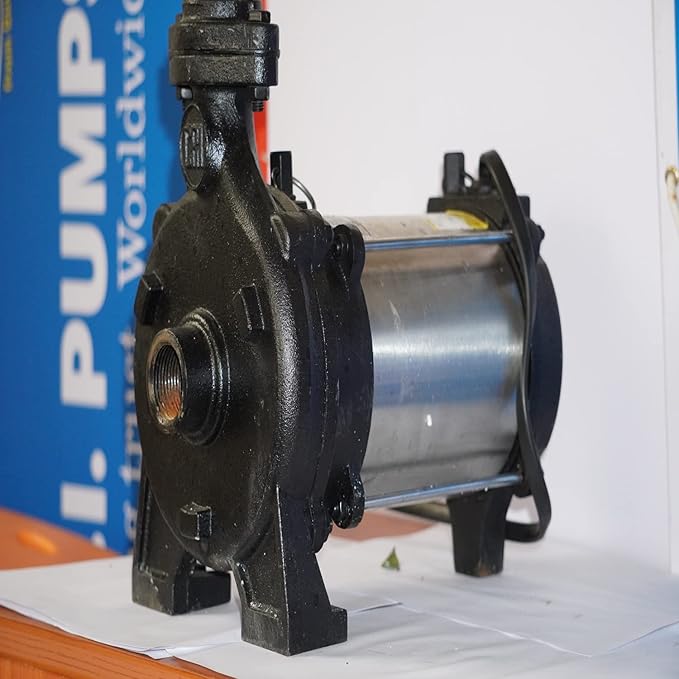
CRI PLANO 50 Openwell
₹8,100
Best For: Rural homes with open wells requiring reliable performance
Warranty: 18 months
- •Power: 0.5 HP
- •Head: 50-70 feet
- •Lightweight design
- •Efficient for shallow wells
- •Easy installation
- •Low maintenance
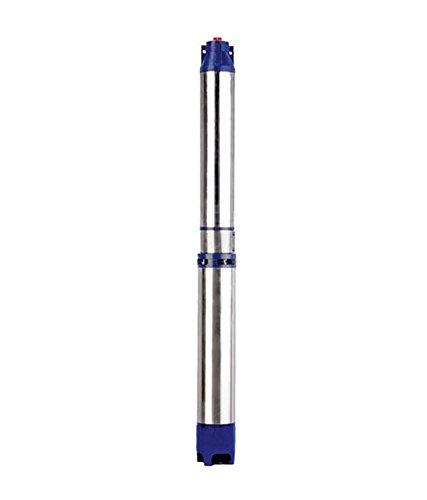
Flojet V-3 Submersible
₹12,100
Best For: Narrow borewells and tight installation spaces
Warranty: 1 year
- •Power: 1 HP
- •Head: 120-150 feet
- •Fits 81mm borewells
- •Compact design
- •Reliable performance
- •Suitable for residential use

Kirloskar KP4 JALRAAJ
₹12,299
Best For: Small to medium borewell applications requiring durability
Warranty: 2 years
- •Power: 1 HP
- •Head: 120-150 feet
- •38mm outlet for higher flow
- •Multicolour design
- •Trusted brand reliability
- •Durable construction

Crompton STPM12 1PH Sewage
₹13,500
Best For: Rural septic systems and areas prone to flooding
Warranty: 1 year
- •Power: 1 HP
- •Head: 100-120 feet
- •Sewage-handling capability
- •Single-phase operation
- •Clog-resistant design
- •Solids handling up to 35mm
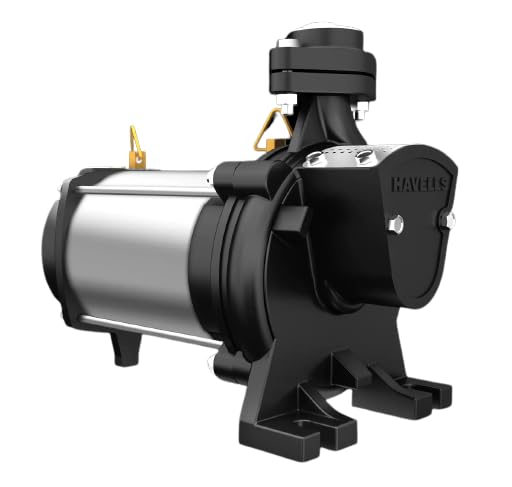
Havells Openwell Submersible
₹9,797
Best For: Medium wells or tanks requiring rust-proof performance
Warranty: 18 months
- •Power: 1 HP
- •Head: 80-100 feet
- •Single-phase operation
- •Rust-proof construction
- •Cable and starter included
- •Suitable for residential use
Technical Comparison: Low-Power Submersible Pumps
| Model | Type | HP | Head (ft) | Flow Rate | Material | Best Feature |
|---|---|---|---|---|---|---|
| CRI Submersible 1 HP | Borewell | 1 | 213 | Not specified | Stainless Steel | Digital control |
| V-Guard 0.5 HP | Openwell | 0.5 | 50-60 | Not specified | Cast Iron | Silent operation |
| Asian Pumps 300W | Both | 0.4 | 170 | 1,500-2,000 LPH | Not specified | Solar powered |
| CRI PLANO 50 | Openwell | 0.5 | 50-70 | Not specified | Not specified | Lightweight |
| Flojet V-3 | Borewell | 1 | 120-150 | Not specified | Not specified | Narrow fit (81mm) |
| Kirloskar KP4 | Borewell | 1 | 120-150 | Not specified | Not specified | 38mm outlet |
| Crompton STPM12 | Sewage | 1 | 100-120 | Not specified | Cast Iron | Solids handling |
| Havells Openwell | Openwell | 1 | 80-100 | Not specified | Rust-proof | Cable included |
How to Choose the Right Low-Power Submersible Pump
For Borewells
Choose the CRI 1 HP or Kirloskar KP4 for standard borewells. For narrow borewells (less than 100mm diameter), the Flojet V-3 is your best option. Consider the Asian Pumps solar model if electricity is unreliable.
Key factor: Match the pump diameter to your borewell size.
For Open Wells
The V-Guard 0.5 HP offers the best value for shallow open wells. For deeper open wells (up to 100 feet), consider the Havells 1 HP model. The CRI PLANO 50 is ideal for budget-conscious rural applications.
Key factor: Consider seasonal water level fluctuations.
For Special Needs
For sewage or wastewater, only the Crompton STPM12 is designed to handle solids. For off-grid or solar applications, the Asian Pumps 300W model offers zero operating costs with adequate sunlight.
Key factor: Match the pump type to your specific water conditions.
Energy Efficiency Comparison
Operating costs can significantly impact the total cost of ownership for a submersible pump. Here’s how our recommended low-power models compare in terms of energy efficiency:
| Model | Power Consumption | BEE Star Rating | Est. Monthly Cost* | Energy Efficiency |
|---|---|---|---|---|
| Asian Pumps 300W Solar | Solar (0 kWh) | N/A (Solar) | ₹0 | |
| V-Guard 0.5 HP | 0.37 kW | 4 Star | ₹222-333 | |
| CRI Submersible 1 HP | 0.75 kW | 5 Star | ₹450-550 | |
| Kirloskar KP4 1 HP | 0.75 kW | 4 Star | ₹450-600 | |
| Crompton STPM12 1 HP | 0.75 kW | 3 Star | ₹500-650 |
*Estimated monthly cost based on 2 hours of operation daily at ₹8/kWh. Actual costs will vary based on usage patterns and local electricity rates.
In the next section, we’ll explore mid-range submersible pumps (1–1.5 HP) that are ideal for medium-depth borewells and larger water requirements.
Mid-Range Submersible Pumps (1–1.5 HP): Ideal for Medium-Depth Borewells
Mid-range submersible pumps in the 1–1.5 HP category offer the perfect balance of power, efficiency, and cost for medium-depth borewells and larger households. These versatile pumps can handle depths of 150-250 feet while providing sufficient flow for properties with multiple bathrooms or moderate irrigation needs.
In this section, we’ll explore the top mid-range submersible pumps available in India, focusing on models that deliver exceptional performance, reliability, and value for typical Indian water requirements.
Our Top 3 Mid-Range Submersible Pump Recommendations

V-Guard 1.5 HP Nova OT1512
₹12,359
Best For: Deeper residential borewells requiring consistent performance
Warranty: 2 years comprehensive
- •Power: 1.5 HP
- •Head: 150-180 feet
- •Digital control panel included
- •Fits 100mm borewells
- •5-star energy rating
- •Copper winding for durability

Crompton 4W12BF1.5E
₹11,999
Best For: Consistent borewell pumping with trusted brand reliability
Warranty: 18 months
- •Power: 1.5 HP
- •Head: 150-200 feet
- •Water-filled motor design
- •Thermal overload protection
- •Corrosion-resistant materials
- •Suitable for 4-inch borewells
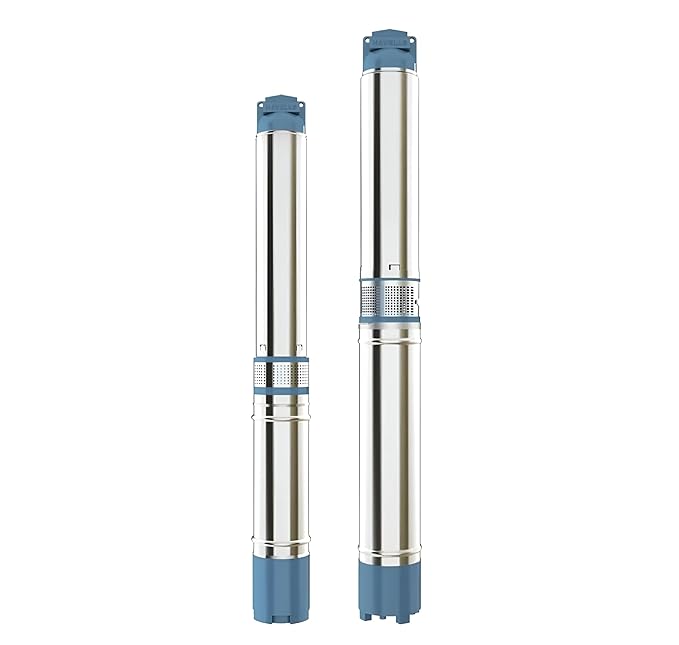
Havells HI FLOW 1.5 HP
₹11,485
Best For: Medium-depth borewells with 100mm diameter
Warranty: 2 years
- •Power: 1.5 HP
- •Head: 150-180 feet
- •Water-filled motor design
- •100mm borewell compatibility
- •Stainless steel components
- •Low maintenance requirements
Why These Mid-Range Pumps Are Ideal for Most Indian Homes
The 1-1.5 HP range represents the sweet spot for most Indian residential applications. These pumps offer sufficient power for medium-depth borewells (150-250 feet) while remaining energy-efficient enough for regular use. Their versatility makes them suitable for both apartment buildings and independent homes with moderate water requirements.
All three of our recommended models feature copper windings, thermal overload protection, and corrosion-resistant materials—essential features for the varied water conditions found across India. Their balanced performance characteristics ensure reliable water supply without excessive electricity consumption.
Technical Comparison: Mid-Range Submersible Pumps
| Model | HP | Head (ft) | Flow Rate (LPM) | Energy Rating | Material | Best Feature |
|---|---|---|---|---|---|---|
| V-Guard Nova OT1512 | 1.5 | 150-180 | 45-60 | 5 Star | Stainless Steel | Digital control panel |
| Crompton 4W12BF1.5E | 1.5 | 150-200 | 40-55 | 4 Star | Stainless Steel | Trusted durability |
| Havells HI FLOW | 1.5 | 150-180 | 42-58 | 4 Star | Stainless Steel | Low maintenance |
Energy Efficiency Comparison
| Model | Power Consumption | BEE Star Rating | Est. Monthly Cost* | Energy Efficiency |
|---|---|---|---|---|
| V-Guard Nova OT1512 | 1.1 kW | 5 Star | ₹660-770 | |
| Crompton 4W12BF1.5E | 1.12 kW | 4 Star | ₹670-790 | |
| Havells HI FLOW | 1.12 kW | 4 Star | ₹670-790 |
*Estimated monthly cost based on 2 hours of operation daily at ₹8/kWh. Actual costs will vary based on usage patterns and local electricity rates.
In the next section, we’ll examine high-power submersible pumps (2–3 HP) designed for deep borewells, agricultural applications, and commercial use cases.
High-Power Submersible Pumps (2–3 HP): For Deep Borewells & Agricultural Use
High-power submersible pumps in the 2–3 HP range are designed for demanding water applications including deep borewells (250+ feet), agricultural irrigation, and commercial use cases. These powerful pumps deliver substantial water flow even from considerable depths, making them essential for farms, large properties, and areas with declining water tables.
In this section, we’ll examine the top high-power submersible pumps available in India, with special attention to models that combine robust performance with energy efficiency and durability in challenging conditions.
Our Top 3 High-Power Submersible Pump Recommendations

Kirloskar KP4 JALRAAJ UVA 60 2016
₹21,192
Best For: Deep, dependable pumping with trusted brand reliability
Warranty: 24 months
- •Power: 2 HP
- •Head: 200-250 feet
- •Single-phase operation
- •Heavy-duty construction
- •Suitable for continuous operation
- •Excellent after-sales service

Asian Pumps V4 2HP Solar
₹27,000
Best For: Medium farms and livestock watering with solar power
Warranty: 18 months
- •Power: 2 HP
- •Head: 100 feet
- •Flow Rate: 9,000 LPH
- •110V BLDC motor technology
- •Solar-powered operation
- •Tank sensor kit included

Flojoy 3HP Solar Water Pump
₹56,500
Best For: Large-scale solar irrigation projects
Warranty: 2 years
- •Power: 3 HP
- •Head: 520-530 feet
- •Flow Rate: 10,000 LPH
- •BLDC motor with AC/DC controller
- •Solar-powered with grid backup
- •Maximum depth capability
Additional High-Power Submersible Pump Options
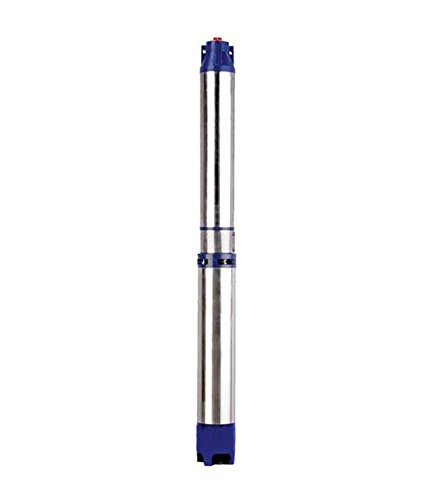
Flojet V-4 Submersible 2 HP
₹20,900
Best For: Serious irrigation projects requiring deep water extraction
Warranty: 18 months
- •Power: 2 HP
- •Head: 250-300 feet
- •Multi-stage impeller design
- •Stainless steel construction
- •Thermal overload protection
- •Suitable for 4-inch borewells
Technical Comparison: High-Power Submersible Pumps
| Model | HP | Head (ft) | Flow Rate (LPH) | Power Source | Material | Best Feature |
|---|---|---|---|---|---|---|
| Kirloskar KP4 JALRAAJ | 2 | 200-250 | Not specified | AC Grid | Stainless Steel | Brand reliability |
| Asian Pumps V4 Solar | 2 | 100 | 9,000 | Solar | Not specified | Zero operating cost |
| Flojoy 3HP Solar | 3 | 520-530 | 10,000 | Solar/AC | Premium SS | Maximum depth |
| Flojet V-4 Submersible | 2 | 250-300 | Not specified | AC Grid | Stainless Steel | High-stage design |
How to Choose the Right High-Power Submersible Pump
Deep Borewells:
Extremely deep borewells (400+ feet): the Flojoy 3HP Solar is unmatched with its 520-530 foot head capacity. Depths between 250-300 feet: the Flojet V-4 offers excellent performance at a more accessible price point.
Key factor: Prioritize head capacity over other features for deep water extraction.
Agricultural Use:
For agricultural applications, flow rate is often more important than maximum depth. The Asian Pumps V4 Solar with its 9,000 LPH flow rate offers excellent irrigation capability for medium farms, while the Flojoy 3HP is ideal for larger operations.
Key factor: Match flow rate to your irrigation area requirements.
Off-Grid Applications:
Both the Asian Pumps V4 and Flojoy 3HP offer solar-powered operation, eliminating electricity costs. The Flojoy model includes AC/DC capability for grid backup during cloudy periods, making it more versatile but at a higher price point.
Key factor: Consider your local solar conditions and backup power needs.
Energy Efficiency and Operating Costs
High-power submersible pumps consume significant electricity, making energy efficiency a critical consideration for long-term operating costs:
| Model | Power Consumption | Power Source | Est. Monthly Cost* | Energy Efficiency |
|---|---|---|---|---|
| Asian Pumps V4 Solar | Solar (0 kWh) | Solar | ₹0 | |
| Flojoy 3HP Solar | Solar (0 kWh) | Solar/AC | ₹0-1,200** | |
| Kirloskar KP4 JALRAAJ | 1.5 kW | AC Grid | ₹900-1,050 | |
| Flojet V-4 Submersible | 1.5 kW | AC Grid | ₹900-1,050 |
*Estimated monthly cost based on 2 hours of operation daily at ₹8/kWh. Actual costs will vary based on usage patterns and local electricity rates.
Frequently Asked Questions About Submersible Pumps
We’ve compiled answers to the most common questions about submersible pumps to help you make an informed decision and maximize your investment.
How do I determine the right HP (horsepower) for my submersible pump?
Determining the correct HP depends on three key factors: (1) the depth of your water source, (2) your daily water requirement, and (3) the vertical distance the water needs to be lifted.
As a general guideline:
- 0.5 HP: depths up to 100 feet and basic household needs (1-2 people) this one is suitable
- 1 HP: Good for depths of 100-150 feet and medium households (3-4 people)
- 1.5 HP: Ideal for depths of 150-250 feet and larger households (5+ people)
- 2-3 HP: Necessary for depths beyond 250 feet or agricultural/commercial applications
For a more precise calculation, refer to our Understanding Submersible Pumps section where we explain how to calculate total head requirements.
Should I choose a borewell or openwell submersible pump?
The choice depends entirely on your water source:
Borewell submersible pumps are designed for narrow, deep wells (typically 4-6 inches in diameter). They have a slim profile with multiple stages to generate sufficient pressure to lift water from greater depths. Choose this if you have a borewell.
Openwell submersible pumps are designed for wider, shallower water sources like open wells, sumps, tanks, or ponds. They typically have a wider diameter and fewer stages. Choose this if you have an open well, tank, or pond.
Using the wrong type will result in poor performance or complete failure, so this is a critical decision based on your water source type.
Is a solar submersible pump worth the higher investment?
Solar submersible pumps like the Asian Pumps V4 2HP Solar or Flojoy 3HP Solar typically cost 2-3 times more than conventional electric pumps, but they can be worth the investment in several scenarios:
Worth it if:
- You’re in an area with unreliable electricity or frequent power cuts
- Your location receives consistent sunlight (5+ hours daily)
- You’re using the pump for agricultural purposes with high electricity costs
- You’re in a remote location where grid connection is expensive
- You plan to use the pump for 5+ years (typical ROI period)
Not worth it if:
- You have reliable, inexpensive electricity
- Your location has limited sunlight or extended cloudy periods
- You have a limited budget and immediate water needs
- You lack space for solar panel installation
Remember that solar pumps have zero operating costs, which typically offsets the higher initial investment within 3-5 years depending on your electricity rates and usage patterns.
Which brands offer the best warranty and after-sales service?
Based on our research and customer feedback, here’s how the major brands compare for warranty and after-sales service:
Top tier (excellent service):
- Kirloskar: 2-5 years warranty (model dependent) with widespread service network in both urban and rural areas
- Crompton: 2-3 years warranty with extensive pan-India service network
Second tier (very good service):
- V-Guard: 2 years warranty with strong service network (especially in South India)
- Havells: 2 years warranty with good urban service coverage
- CRI: 2-3 years warranty with growing service network (strong in agricultural regions)
Third tier (adequate service):
- Flojoy: 2 years on motor, 1 year on controller with specialized solar-focused service
- Flojet: 1 year warranty with limited service network
- Asian: 1 year warranty with specialized urban service centers
For critical applications where downtime is not acceptable, we recommend sticking with the top-tier brands. For more details, see our Brand Comparison section.
What is the total cost of owning a submersible pump?
The total cost of ownership (TCO) for a submersible pump extends well beyond the initial purchase price. Here’s a comprehensive breakdown:
1. Initial costs:
- Pump unit: ₹5,000-60,000 (depending on HP and quality)
- Control panel/starter: ₹2,000-10,000
- Installation: ₹2,000-10,000
- Piping and accessories: ₹3,000-15,000
- Wiring and electrical: ₹1,500-5,000
2. Operating costs (over 5 years):
- Electricity: ₹20,000-60,000 (varies by HP, efficiency, and usage)
- Routine maintenance: ₹5,000-15,000
3. Repair and replacement costs:
- Minor repairs: ₹2,000-8,000 (typically 1-2 times over lifespan)
- Major overhaul: ₹5,000-20,000 (typically once over lifespan)
- Component replacements: ₹1,000-5,000 (capacitors, seals, etc.)
Example 5-year TCO comparison:
Economy 1 HP pump:
Initial cost: ₹15,000 (all inclusive)
Electricity: ₹45,000 (less efficient)
Maintenance/repairs: ₹12,000 (more frequent)
Total 5-year TCO: ₹72,000
Premium 1 HP pump:
Initial cost: ₹25,000 (all inclusive)
Electricity: ₹36,000 (more efficient)
Maintenance/repairs: ₹6,000 (less frequent)
Total 5-year TCO: ₹67,000
Key insight: Despite a 67% higher initial cost, the premium pump actually costs less over 5 years due to energy savings and reduced maintenance. This illustrates why considering TCO rather than just purchase price leads to better long-term value.
Is it worth repairing an old submersible pump or better to replace it?
This common dilemma depends on several factors. Here’s a decision framework:
When repair makes sense:
- Pump is less than 5 years old
- The repair cost is less than 40% of a new pump
- The issue is clearly identified and limited to a specific component
- The pump has otherwise performed well
- Replacement parts are readily available
- The pump model is still current (not obsolete)
When replacement makes sense:
- Pump is over 7 years old
- Repair cost exceeds 50% of a new pump
- Multiple components need repair
- This is not the first major repair
- Newer models offer significant energy efficiency improvements
- Your water needs have changed (requiring different HP or specifications)
- Parts are difficult to source or expensive
Cost-benefit calculation:
1. Get a repair quote from a reliable technician
2. Research the cost of an equivalent new pump (including installation)
3. Calculate the repair-to-replacement ratio: Repair Cost ÷ Replacement Cost
4. If the ratio is over 0.5 (50%), replacement is usually more economical
5. If the ratio is under 0.3 (30%), repair is usually more economical
6. For ratios between 0.3-0.5, consider the pump’s age and history
Example: For a 6-year-old 1 HP pump with a repair quote of ₹6,000 and replacement cost of ₹15,000, the ratio is 0.4 (40%). Given the age and middle-range ratio, replacement is likely the better long-term decision, especially if newer models offer better efficiency.

About the authors
About Avani & Sanksar — Co-Founders, GrowWithHeart
We’re two water-tech researchers obsessed with simplifying your pump-buying journey. Since 2023, we’ve helped over 5,000 Indian readers cut through noise and find the right pump—without marketing fluff.
At GrowWithHeart, we don’t physically test pumps—but we analyze 2,000+ customer reviews, talk to pump dealers from Chennai to Chandigarh, and use machine learning to identify the best products by need. Whether you’re dealing with low pressure in a high-rise or sandy borewell water in a village, we’ve got you covered.
Conclusion: Making the Right Submersible Pump Choice for Your Water Needs
Throughout this comprehensive guide, we’ve explored the world of submersible pumps from every angle—from basic principles to detailed comparisons of the top models available in India. Let’s summarize the key insights to help you make an informed decision.
Key Takeaways
Understanding Your Requirements
- Match HP rating to your water depth and daily requirements
- Consider both head capacity and flow rate for optimal performance
- Choose the right type (borewell vs. openwell) for your water source
- Factor in water quality (hard, sandy, etc.) when selecting materials
Long-Term Value Considerations
- Energy efficiency often outweighs initial purchase price
- Quality materials and construction extend operational life
- After-sales service network is crucial for timely maintenance
- Proper installation and protection features prevent premature failure
Our Top Recommendations by Category
| Category | Best Overall | Best Value | Best Eco-Friendly |
|---|---|---|---|
| Low-Power (0.4-1 HP) | CRI Submersible Pump 1 HP | V-Guard 0.5 HP Openwell | Asian Pumps 24V 300W Solar |
| Mid-Range (1-1.5 HP) | V-Guard 1.5 HP Nova OT1512 | Crompton 4W12BF1.5E | Havells HI FLOW 1.5 HP |
| High-Power (2-3 HP) | Kirloskar KP4 JALRAAJ UVA 60 2016 | Flojet V-4 Submersible 2 HP | Flojoy 3HP Solar Water Pump |
Scenario-Based Recommendations
Urban Apartments:
Ideal for supplementing municipal water in apartment buildings with underground tanks or shallow borewells.
- Best choice: V-Guard 0.5 HP Openwell
- Key features: Quiet operation, compact size, energy efficiency
Independent Homes:
Medium-depth borewells serving independent houses with multiple bathrooms and garden needs.
- Best choice: CRI Submersible Pump 1 HP
- Key features: Reliable performance, digital control, good service network
Agricultural Use:
Designed for irrigation of small to medium farms with deep borewells or unreliable electricity.
- Best choice: Flojoy 3HP Solar Water Pump
- Key features: Zero operating cost, high flow rate, exceptional depth capacity
Final Thoughts
Selecting the right submersible pump is a significant decision that impacts your daily water availability, electricity bills, and long-term satisfaction. While the initial investment might seem substantial, remember that a quality pump will serve you reliably for 8-10 years or more, making it a worthwhile investment in your property’s infrastructure.
Throughout our analysis, we’ve seen that the best value doesn’t always mean the lowest price BUT Energy efficiency, durability, after-sales service, and appropriate sizing for your specific needs are equally important factors that determine the true value of your purchase.
Whether you’re replacing an aging pump or installing a new system, we hope this guide has equipped you with the knowledge to make an informed decision. Water is a precious resource, and the right submersible pump ensures you can access it efficiently and reliably for years to come.
Pro Tip: Once you’ve selected your ideal submersible pump, consider having it installed by a certified professional because they understands the electrical and plumbing requirements. Proper installation with appropriate protection devices can significantly extend your pump’s lifespan and ensure optimal performance.
For specific product details and current pricing, click through to the product links provided in our detailed reviews. Remember that prices may vary based on location, seasonal promotions, and retailer margins.
We wish you success in finding the perfect submersible pump that meets your water needs efficiently and reliably for years to come! BUT, BECAUSE
